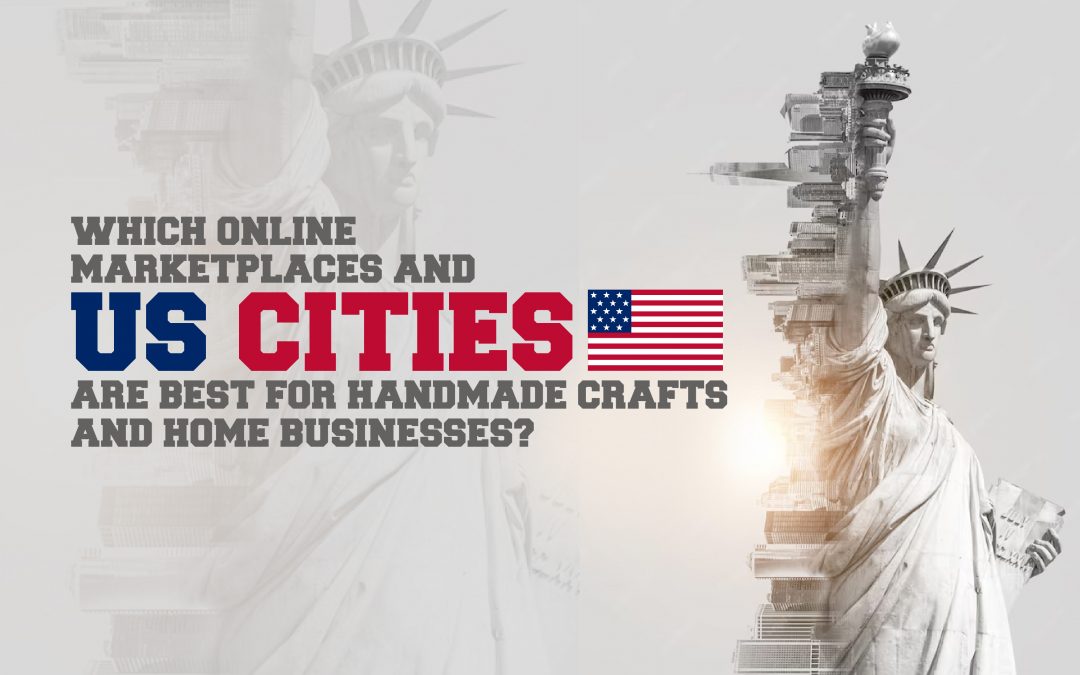For US home businesses specializing in handmade crafts and unique products, choosing the right online marketplace and location can significantly impact success. Here’s a comprehensive guide to popular online platforms and cities that are ideal for growing your home-based business.
Top Online Marketplaces for Handmade Crafts and Home Businesses
1. Amazon Handmade
Focus: Handmade products crafted by artisans.
- Target Audience: Sellers aiming to access Amazon’s extensive customer base.
- Features: Integration with Amazon’s global marketplace, access to Amazon Prime customers, and fulfillment options like Fulfillment by Amazon (FBA).
- Pros:
- Large Customer Base: Benefits from Amazon’s massive reach and credibility.
- Fulfillment Options: Utilize FBA for streamlined shipping and customer service.
- Cons:
- Higher Fees: More expensive compared to some other platforms online marketplace.
- Intense Competition: High competition due to the broad range of products available.
2. Etsy
Focus: Handmade, vintage, and unique factory-manufactured items.
- Target Audience: Artisans, crafters, and vintage sellers seeking a platform to showcase their unique creations.
- Features: Customizable shop pages, integrated payment processing, marketing tools, and access to a large, engaged customer base.
- Pros:
- Established Marketplace: Etsy’s reputation helps attract buyers specifically interested in handmade and unique products.
- User-Friendly: Simple setup and easy-to-navigate interface.
- Built-In Tools: Includes promotional tools, social media integration, and customer engagement features.
- Cons:
- Fees: Listing fees, transaction fees, and payment processing fees can accumulate.
- High Competition: Millions of sellers can make it difficult to stand out without strategic marketing.
3. eBay
Focus: Broad range of products including new, used, and handmade items.
- Target Audience: General consumers and collectors seeking diverse product categories.
- Features: Auction-style and fixed-price listings, global reach, and integrated payment systems.
- Pros:
- Diverse Marketplace: Offers flexibility in listing formats and broad product categories.
- Global Reach: Access to a large international audience.
- Cons:
- Listing and Final Value Fees: Fees can impact profit margins online marketplace.
- Varied User Experience: The broad focus can be less ideal for niche products.
4. ArtFire
Focus: Handmade, vintage, and craft supplies.
- Target Audience: Artisans and craft enthusiasts.
- Features: Customizable storefronts, seller support, and promotional tools.
- Pros:
- Niche Focus: Dedicated to handmade and craft items, attracting a targeted audience.
- Lower Fees: Generally lower fees compared to larger platforms.
- Cons:
- Smaller Customer Base: Less traffic compared to larger marketplaces.
- Limited Exposure: This may require additional marketing efforts to increase visibility.
5. Zibbet
Focus: Handmade, vintage, and craft supplies.
- Target Audience: Sellers of unique and artisanal products.
- Features: Integrated multi-channel selling, including a built-in marketplace and social media integration.
- Pros:
- Flat Monthly Fee: No listing fees; the monthly fee structure is predictable.
- Multi-Channel Selling: Ability to sell across various platforms from a single account.
- Cons:
- Smaller Marketplace: Limited traffic compared to more established platforms.
- Limited Marketing Tools: Fewer built-in promotional tools online marketplace.
6. Bonanza
Focus: General marketplace with a section for handmade items.
- Target Audience: Broad range of consumers.
- Features: User-friendly interface, low fees, and integration with social media and Google Shopping.
- Pros:
- Low Fees: Typically lower fees and more flexible pricing.
- Integration Capabilities: Connects with other online selling platforms for broader reach.
- Cons:
- Smaller Marketplace: Less targeted traffic for handmade goods.
- Fewer Built-In Marketing Tools: This may require additional marketing efforts to drive traffic.
7. Shopify
Focus: Customizable e-commerce platform for a wide range of products, including handmade crafts.
- Target Audience: Sellers looking to create their own online store with full control over design and functionality.
- Features: Customizable storefronts, integrated payment processing, marketing tools, and analytics.
- Pros:
- Customizability: Full control over the design and functionality of your online store.
- Integrated Tools: Includes tools for SEO, marketing, and inventory management.
- Cons:
- Monthly Fees: Costs can be higher, especially with premium themes and apps.
- Setup Complexity: Requires more effort to set up compared to ready-made marketplaces.
8. Big Cartel
Focus: E-commerce platform tailored for independent artists and makers.
- Target Audience: Small-scale sellers and artists who want a simple setup for their online store.
- Features: Easy-to-use interface, customizable storefronts, and integration with payment gateways.
- Pros:
- Simple Setup: User-friendly interface ideal for beginners.
- Affordable Pricing: Free tier available with basic features, and affordable paid plans.
- Cons:
- Limited Features: Less advanced features compared to larger platforms like Shopify.
- Scalability: May not be suitable for larger or more complex businesses.
9. Redbubble
Focus: Print-on-demand products featuring user-submitted designs.
- Target Audience: Artists and designers who want to sell their artwork on various products without handling inventory.
- Features: Integration with a print-on-demand service, global reach, and marketing tools.
- Pros:
- No Inventory Management: Redbubble handles production, shipping, and customer service.
- Global Audience: Access to a broad, international customer base.
- Cons:
- Lower Profit Margins: Redbubble takes a percentage of each sale.
- Less Control: Limited control over product quality and pricing.
10. Society6
Focus: Print-on-demand art and home décor products.
- Target Audience: Artists and designers who want to sell their designs on home décor items and accessories.
- Features: Integration with a print-on-demand service, artist promotion, and global shipping.
- Pros:
- Ease of Use: Society6 manages production and shipping.
- Artist Exposure: Offers promotional opportunities and artist features.
- Cons:
- Lower Revenue: Society6 takes a significant portion of each sale.
- Limited Customization: Less control over product options and pricing.
11. Folksy
Focus: Handmade goods and crafts (UK-based).
- Target Audience: Artisans and crafters in the UK.
- Features: Focuses on handmade and unique items, with a strong community of UK-based makers.
- Pros:
- Community Focus: Strong emphasis on supporting UK artisans.
- Niche Market: Specialized in handmade products.
- Cons:
- Limited Global Reach: Primarily serves a UK audience.
- Smaller Marketplace: Less traffic compared to global platforms.
Top US Cities for Home Businesses
1. Los Angeles, CA
- Why: Large creative community, significant market for handmade and unique goods, and strong support for small businesses.
- Opportunities: Networking events, local craft fairs, and a large customer base for online sellers.
2. New York City, NY
- Why: Diverse and vibrant market with a high demand for unique and artisanal products.
- Opportunities: Access to numerous craft fairs, trade shows, and a bustling marketplace.
3. San Francisco, CA
- Why: Hub for tech-savvy entrepreneurs and a strong market for niche and handmade products.
- Opportunities: High concentration of potential customers and opportunities for collaborations with other businesses.
4. Austin, TX
- Why: Known for its creative and entrepreneurial spirit, with a growing community of makers and crafters.
- Opportunities: Popular craft fairs, supportive business networks, and a thriving local market.
5. Seattle, WA
- Why: Strong focus on sustainability and unique products, with a growing interest in handmade and local goods.
- Opportunities: Supportive community for artisans, local markets, and craft events.
6. Portland, OR
- Why: Known for its emphasis on local, handmade, and artisanal products, making it a prime location for home businesses in crafts.
- Opportunities: Vibrant craft scene, local markets, and strong support for small businesses.
7. Denver, CO
- Why: Growing market for handmade and local products, with a supportive entrepreneurial environment.
- Opportunities: Craft fairs, local events, and a community interested in unique and artisanal goods online marketplace.
Choosing the Right Platform and Location.
When starting or growing your home business, consider:
- Product Type: Choose a platform that aligns with your product offerings, whether handmade, vintage, or unique items.
- Fees and Costs: Evaluate the fee structures of each platform and how they affect your profitability.
- Customer Reach: Consider the platform’s audience size and relevance to your target market.
- Features and Tools: Look for platforms offering tools and support to manage and grow your business effectively.
- City Opportunities: Select a city that provides the support, market reach, and networking opportunities necessary for your business.
Understanding these aspects will help you make informed decisions about where to sell and grow your business, maximizing your potential for success in the competitive landscape of handmade crafts and home businesses.
FAQs
1. What are the best online marketplaces for handmade crafts?
Amazon Handmade, eBay, ArtFire, Zibbet, Bonanza, Shopify, Big Cartel, Redbubble, Society6, and Folksy.
2. How do I choose the right online marketplace for my products?
Consider the platform’s fee structure, audience reach, and features that match your product type.
3. Which US cities are ideal for starting a home business in handmade crafts?
Los Angeles, New York City, San Francisco, Austin, Seattle, Portland, and Denver.
4. What factors should I consider when selecting a city for my home business?
Look at market demand, networking opportunities, cost of living, and local support for small businesses.
5. How can I increase my visibility and sales on online marketplaces?
Optimize your listings, promote your store, engage with customers, and use platform tools effectively.












